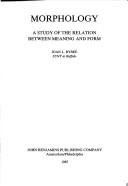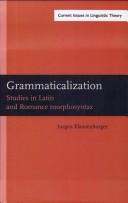| Listing 1 - 10 of 149 | << page >> |
Sort by
|
Book
ISBN: 9789033489792 Year: 2012 Publisher: Leuven : Acco,
Abstract | Keywords | Export | Availability | Bookmark
 Loading...
Loading...Choose an application
- Reference Manager
- EndNote
- RefWorks (Direct export to RefWorks)
De morfologie is de wetenschappelijke studie van de structuur en de vorming van woorden. Dit boek biedt een beknopt maar systematisch overzicht van de basisbegrippen Morfologie die de taalkunde hanteert om die structuur te beschrijven en te bestuderen. Het boek veronderstelt geen taalkundige voorkennis en is bedoeld voor al wie grondig kennis wil maken met de verschillende aspecten van de woordstructuur van het Nederlands. Voor studenten Taalkunde of Logopedische en Audiologische Wetenschappen kan het fungeren als studiemateriaal bij een inleidende module Morfologie.
#KVHB:Morfologie --- morfologie --- 801.55 --- Academic collection --- taalkunde --- 801.55 Morfologie--(taalkunde) --- Morfologie--(taalkunde) --- Dutch language --- Grammar
Year: 2015 Publisher: Prague [Czech Republic] : Univerzita Karlova v Praze, Nakladatelství Karolinum
Abstract | Keywords | Export | Availability | Bookmark
 Loading...
Loading...Choose an application
- Reference Manager
- EndNote
- RefWorks (Direct export to RefWorks)
Obsahem příručky Morfologie je víceméně ucelený popis funkčního tvarosloví současné (zejména spisovné) češtiny; formální morfologii se věnuje jen obecně, neuvádí paradigmata jednotlivých ohýbacích typů ani popisy nepravidelností ve flexi. V oblasti morfologických kategorií volí spíše formální než sémantický přístup. Do značné míry vychází z obvyklého pojetí morfologie češtiny, tak jak je obsaženo v běžně dostupných mluvnicích a kompendiích (Mluvnice češtiny 2, Encyklopedický slovník češtiny, Příruční mluvnice češtiny a Čeština – řeč a jazyk).Tato příručka má charakter vysokoškolské učebnice; je určena posluchačům povinné přednášky z morfologie, která je součástí studijního plánu bakalářského oboru český jazyk a literatura na FF UK v Praze.
Language and Literature Studies --- morfologie --- příručka --- čeština --- tvarosloví --- český jazyk

Year: 2014 Publisher: Prague [Czech Republic] : Univerzita Karlova v Praze, Nakladatelství Karolinum
Abstract | Keywords | Export | Availability | Bookmark
 Loading...
Loading...Choose an application
- Reference Manager
- EndNote
- RefWorks (Direct export to RefWorks)
Příručka Úvodní jazykový seminář: výklad a cvičení nabízí základní výklad ke čtyřem lingvistickým disciplínám (morfematika, slovotvorba, morfologie a syntax), jednotlivé části jsou vždy doprovázené řadou příkladů, a ke každé vykládané disciplíně je uvedeno několik cvičení (včetně klíče). Výklady nemají být komplexním popisem příslušné roviny českého jazyka, jsou zacíleny k tomu, aby na jejich základě čtenáři-studenti zdokonalili svou dovednost jazykového rozboru.Vedle získání základní orientace v jazykovém systému češtiny a vedle rozvoje dovednosti jazykové analýzy si musí začínající odborník na češtinu rovněž osvojit základní jazykovědnou terminologii – k tomuto účelu je na závěr příručky zařazen terminologický slovník s příslušnými hesly.
Language and Literature Studies --- morfematika --- slovotvorba --- morfologie --- lingvistika --- syntax
Book
ISBN: 9029096241 Year: 1984 Publisher: Amsterdam Meulenhoff Informatief
Abstract | Keywords | Export | Availability | Bookmark
 Loading...
Loading...Choose an application
- Reference Manager
- EndNote
- RefWorks (Direct export to RefWorks)
Zoology --- Vlinders --- Dagpauwogen --- Dierethologie --- Morfologie (biologie) --- Voortplanting --- 597.83 --- Morfologie --- vlinder --- Vlinders en rupsen --- Vlinder --- Dagpauwoog --- Ethologie --- Voortplanting (biologie)
Book
ISBN: 1443877646 9781443877640 1443881295 9781443881296 Year: 2015 Publisher: Newcastle upon Tyne, England : Cambridge Scholars Publishing,
Abstract | Keywords | Export | Availability | Bookmark
 Loading...
Loading...Choose an application
- Reference Manager
- EndNote
- RefWorks (Direct export to RefWorks)
This book presents the onomasiological approach to word formation and applies it to neoclassical formations, using data taken from English and Russian medical terminology. The phenomenon of neoclassical formations is challenging for morphological theory because it raises questions about determining its boundaries as a distinct category. The difficulties of differentiating between compounding and affixation, between blending and compounding, and between word formation and borrowing represent key problematic areas here. The basic underlying hypothesis considered in this book is that the position
801.55 --- 801.55 Morfologie--(taalkunde) --- Morfologie--(taalkunde) --- Grammar, Comparative and general --- Derivational morphology --- Word formation --- Word formation. --- Derivation --- Morphology --- Linguistics --- Philology
Book
ISBN: 9029098775 Year: 1988 Publisher: Amsterdam Meulenhoff Jeugd
Abstract | Keywords | Export | Availability | Bookmark
 Loading...
Loading...Choose an application
- Reference Manager
- EndNote
- RefWorks (Direct export to RefWorks)
Dassen (dieren) --- Roofdieren --- Zoogdieren --- Dierethologie --- Morfologie (biologie) --- 598.95 --- Das --- Das (dieren) --- Roofdier --- Zoogdier --- Ethologie
Book
ISBN: 9029099070 Year: 1988 Publisher: Amsterdam Meulenhoff Jeugd
Abstract | Keywords | Export | Availability | Bookmark
 Loading...
Loading...Choose an application
- Reference Manager
- EndNote
- RefWorks (Direct export to RefWorks)
Beren --- Roofdieren --- Zoogdieren --- Verspreiding --- Dierethologie --- Morfologie (biologie) --- 598.95 --- Beer (dier) --- Roofdier --- Zoogdier --- Ethologie

ISSN: 01677373 ISBN: 9027228787 9027228779 0915027380 0915027372 9786613174789 1283174782 9027283915 9789027228772 9789027283917 9789027228789 9780915027378 9780915027385 Year: 1985 Volume: v. 9 Publisher: Amsterdam ; Philadelphia : J. Benjamins,
Abstract | Keywords | Export | Availability | Bookmark
 Loading...
Loading...Choose an application
- Reference Manager
- EndNote
- RefWorks (Direct export to RefWorks)
This is a textbook right in the thick of current interest in morphology. It proposes principles to predict properties previously considered arbitrary and brings together the psychological and the diachronic to explain the recurrent properties of morphological systems in terms of the processes that create them. For the student, the clear discussion of morphology and morphophonemics and the rich variety of data brought in on the way to the theoretical conclusion is material for a direct learning experience.
--Grammar --- 801.55 --- 801.55 Morfologie--(taalkunde) --- Morfologie--(taalkunde) --- Grammar --- Grammaire comparée --- --Morphologie --- Morphologie. --- Woordvorming. --- --Morphologie. --- --801.55 --- Grammar, Comparative and general --- Linguistics --- Philology --- Morphology. --- Grammatical categories. --- Morphologie --- Grammar, Comparative and general Morphology --- Morphology
Book
ISBN: 9780521884976 0521884977 9780511576539 9781107407695 9780511517938 0511517939 9780511515460 0511515464 0511576536 1107200431 9786612103889 0511514395 0511516746 1107407699 9781107200432 6612103884 9780511514395 9780511516740 9781282103887 1282103881 9780511517440 0511517440 Year: 2009 Publisher: Cambridge, UK ; New York : Cambridge University Press,
Abstract | Keywords | Export | Availability | Bookmark
 Loading...
Loading...Choose an application
- Reference Manager
- EndNote
- RefWorks (Direct export to RefWorks)
Where do dialects differ from Standard English, and why are they so remarkably resilient? This study argues that commonly used verbs that deviate from Standard English for the most part have a long pedigree. Analysing the language use of over 120 dialect speakers, Lieselotte Anderwald demonstrates that not only are speakers justified historically in using these verbs, systematically these non-standard forms actually make more sense. By constituting a simpler system, they are generally more economical than their Standard English counterparts. Drawing on data collected from the Freiburg English Dialect Corpus (FRED), this innovative and engaging study will be of great interest to students and researchers of English language and linguistics, morphology and syntax.
Dialectology --- Grammar --- English language --- 802.0-087 --- 802.0-55 --- 802.0-55 Engels: morfologie --- Engels: morfologie --- 802.0-087 Engels: dialecten --- Engels: dialecten --- Dialects --- Verb --- Conjugation --- Periphrastic verbs --- Verb phrase --- Verb. --- Arts and Humanities --- Language & Linguistics --- Germanic languages

ISBN: 902723700X 1556199716 9786612163753 1282163752 9027299625 9781556199714 Year: 2000 Volume: 193 Publisher: Amsterdam ; Philadelphia : John Benjamins,
Abstract | Keywords | Export | Availability | Bookmark
 Loading...
Loading...Choose an application
- Reference Manager
- EndNote
- RefWorks (Direct export to RefWorks)
In this monograph, various aspects of the morphosyntactic evolution of the Romance languages are shown to interact in a theory of grammaticalization. The study argues for the incorporation and subordination of inflectional morphology within a grammaticalization continuum, constituting but a portion of the latter. Parameters of natural morphology are seen as principles of grammaticalization, but the reverse is also true, rendering grammaticalization and natural morphology indistinguishable. In the context of this theoretical framework, Chapter 2 deals with Latin, French, and Italian verbal inflection, focusing on universal and system-dependent parameters of natural morphology. In Chapter 3, a theory of grammaticalization is built on divergent elements, including not only grammaticalization studies proper, but also the perception/production line of inquiry, and typology and branching issues, permitting the phasing out of the traditional synthesis/analyis cycle. Chapter 4 touches on nominal inflection, in particular that of Old French and Rumanian, the most revealing histories in the Romance domain. Chapter 5, finally, thoroughly discusses extant theoretical questions in grammaticalization, prominently featuring the relevance of 'invisible hand' explanations and the crucial role played by unidirectionality. This study will be of interest to specialists in Romance and historical linguistics, as well as morphological theory.
Romance languages --- Classical Latin language --- Grammar --- 804.0-55 --- 804.0-56 --- 807.1-55 --- 807.1-56 --- 804 --- Frans: morfologie --- Frans: syntaxis; semantiek --- Latijn: morfologie --- Latijn: syntaxis; semantiek --- Romaanse taalkunde --- 804 Romaanse taalkunde --- 807.1-56 Latijn: syntaxis; semantiek --- 807.1-55 Latijn: morfologie --- 804.0-56 Frans: syntaxis; semantiek --- 804.0-55 Frans: morfologie --- Latin language --- Morphology. --- Syntax. --- Latin language - Morphology. --- Romance languages - Morphology. --- Romance languages - Syntax. --- Latin language - Syntax. --- Morphology --- Syntax
| Listing 1 - 10 of 149 | << page >> |
Sort by
|

 Search
Search Feedback
Feedback About UniCat
About UniCat  Help
Help News
News